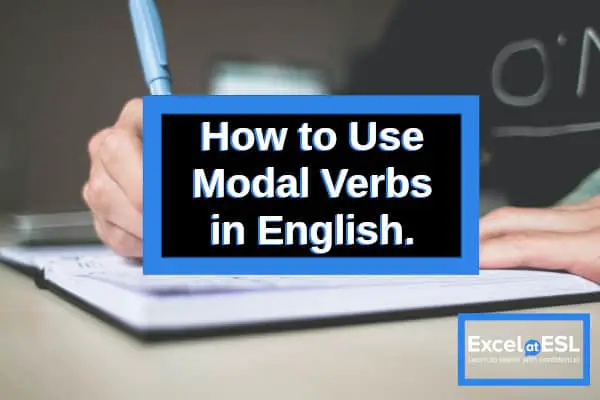“Modals verbs” are a class of verbs used to express ideas like intention, likelihood, ability, or to give advice. You can call them helper verbs. They always appear with a main verb. English has nine of them:
- can
- could
- will
- would
- shall
- should
- may
- might
- must
How to use modal verbs.
You may also find modal verbs referred to as “auxiliary verbs”. Basically, this means “helper verb”. This is because they help the main verb by adding extra information about it to the sentence. The information it adds lets the listener know things like our intentions, the likelihood of an event, or if they are capable of or allowed to do something.
Check out the table below for more information:
| Helper Verb | Meaning |
|---|---|
| can | ability to do something “I can play the piano.” permission to do something “You can sit down now.” asking permission “Can I drink the juice?” |
| could | ability to do something (past) “I could run fast when I was young.” permission to do something (past) “You said I could eat the ice cream.” potential to do something “It could snow.” |
| will | intention to do something “I will sleep now.” reported action (future) (informal) “I will eat dessert after dinner.” making a promise “I will be there.” explaining something as certain “The paper will burn.” |
| would | intention to do something (past) “I would have eaten the apple.” reported habitual action (past) “I would always play baseball after lunch.” |
| shall | asking permission (formal/polite) “Shall I take your coat?” reported action (future) (formal/polite) “I shall eat dessert after dinner.” |
| should | making suggestions “You should say sorry.” expressing intention “I should go to bed now.” |
| may | expressing intention “I may go to bed now.” giving permission “You may leave now.” making predictions “She may compete in the Olympics this year.” potential of an event “It may rain.” |
| might | expressing intention “I might go to bed now.” making suggestions or predictions “You might want to eat some salad.” |
| must | giving orders “You must stop talking.” expressing obligations “I must pay my debts.” |
Modal verbs always appear to the left of the main verb. They also appear in front of any other helper verbs or adverbs that also appear in the sentence.
- The student should write her essay soon.
- The student may have written her essay two hours ago.
- The student will have already written her essay by now.
How not to use modal verbs.
There are quite a few restrictions modal verbs have for proper use. Let’s look at some examples of ways you cannot use modal verbs:
- You can’t use them alone.
 He may.
He may.
Note: You can say sentences like the ones above but only if they come after a sentence that has already used a main verb. Then the verb is implied in the modal sentence. You can’t only say a sentence like the ones above alone. They can.
They can.
 “You should start your homework.”
“You should start your homework.” “Yeah, I should (start my homework).”
“Yeah, I should (start my homework).”
- You can’t add verb endings.
 You shoulded.
You shoulded. I maying.
I maying.
- You can’t make them into commands.
 Can!
Can! Might!
Might!
- You can’t make them negative.
 He not shall make dinner.
He not shall make dinner. You not should play games.
You not should play games.
You might think that modals can be made negative due to sentences such as:
 “I might not.”
“I might not.” “You shall not.”
“You shall not.”
However, this is only true if the main verb is already understood. If the main verb is unknown when you say this, it will be incorrect because the listener does not know what the person might not or shall not do.
The underlying structure of the sentence above is actually something like this:
 “I might not (eat a hamburger today).”
“I might not (eat a hamburger today).” “You shall not (go to bed late tonight).”
“You shall not (go to bed late tonight).”
You can never use a modal verb alone. There must be a main verb stated, either implicitly (known without being said) or explicitly (said directly).
Extra Modal Phrases
You caught me!
These aren’t all the possible modal verbs in English. There are also a few more interesting modal phrases you can use in English.
ought to
This phrase is used to make suggestions or to declare your intentions. It is very similar to the modal verb “should”. You most often hear this in spoken English; it is often said during informal situations.
The suggestions you make with this phrase are subtle. It isn’t a very strong way to give advice or make a suggestion. You should use this phrase when you want to be delicate about giving someone some advice.
It isn’t advisable to use this phrase in formal academic writing, but you can use it to spice up your informal spoken English.
Here are some example sentences using the phrase “ought to”:
- You ought to stop eating so much cake.
- I ought to eat more vegetables.
- He ought not return without some money.
- You think I ought to start writing now?
However, unlike “should”, this phrase cannot appear at the front of a question.
 Shouldn’t you be at work today?
Shouldn’t you be at work today? Oughtn’t you be at work today?
Oughtn’t you be at work today?
Note: The word “oughtn’t” has become rare in North American English. In the past, this structure was possible, but today this sounds incredibly strange to my ears. There may be a dialect of English that still uses “oughn’t”, but in my Canadian dialect it isn’t used. Should you be at work today?
Should you be at work today? Ought you be at work today?
Ought you be at work today?
had better
This is another informal modal phrase. Like “ought to”, you will most often hear this phrase spoken in informal situations. This phrase is similar to the modal verb “should” as well. It is used to make a suggestion in a stronger way than “should” or “ought to”.
You should be careful about using this as you can easily sound rude if you use it in a wrong situation. In my mind, this is most often used by parents when talking to their children.
Again, I would advise you against using this phrase in academic writing.
Here are some example sentences:
- You had better eat your vegetables.
- You had better go to bed early tonight.
- You had better wash your hands.
- You had better smarten up.
have to
Like the previous two phrases, this phrase is also (mostly) informal. Most of these extra modal phrases will help you expand your vocabulary for spoken English in informal situations.
This phrase is similar to the modal verb “must”. You use this phrase when you are giving orders or expressing obligations.
You should avoid using this in academic writing. Instead, you should use “must”.
Here are some example sentences:
- I have to go to bed.
- I have to pet my dog.
- I have to make dinner.
- I have to go to work.
got to
You have probably seen this phrase before. Most often, you see this written or said in its contracted form as “gotta”. This means the exact same thing as “have to”, but it is more informal.
Needless to say, this is an informal usage of English. You should not write this academically.
Here are some example sentences:
- I got to (gotta) go to bed.
- I got to (gotta) pet my dog.
- I got to (gotta) make dinner.
- I got to (gotta) go to work.
Dare
This isn’t commonly used anymore in casual English. You may sound strange or archaic if you say this while speaking. However, it isn’t rare to see it written in stories or hear it said in movies and TV shows.
“Dare” isn’t exactly the same as any single modal verb or phrase we have looked at previously. The meaning of it depends on how it is being used. For example, it can be similar to the modal verbs “will” or “shall” in the following sentences:
- I dare to dream.
- I dare not say.
- Dare I even look?
However, the feelings of the sentences above aren’t exactly the same as if you used the words “will” or “shall”.
“Dare” gives the sentence the feelings of a conflicting desire. It’s usually used in situations where the speaker wants to do something but knows they shouldn’t.
It also makes the sentences sound a bit poetic. This isn’t really appropriate to write for academic texts and you likely want to avoid saying things like this to your friends or co-workers unless you’re making a joke.
Conclusion
That was everything you need to know about using modal verbs in English!
We even got to look at a few common modal phrases you can use to spice up your conversations, great deal huh?
I hope you learned something useful by reading this article. If you want to learn more about English grammar, check out my other articles on the topic.
Did you know I’m available for personalized 1 on 1 English conversation coaching? It’s true! You can read about it here.
Until next time, happy studying!



 He may.
He may. “You should start your homework.”
“You should start your homework.”